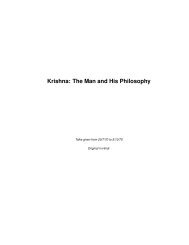CHAPTER 8. WHAT WORDS CANNOT SAY...And the other shore is not far away. It needs only a little meditativeness, a little silence. We aretouching the other shore every night. It has to be touched many times before you be<strong>com</strong>e acquainted<strong>with</strong> the new space, the new world. Going to the other shore is not just going to the other shore,you will have to leave all that you are on this shore. Only the essential, vital life principle will go tothe other shore. Slowly slowly one learns, and slowly slowly one gathers the eyes to see the beauty<strong>of</strong> the other shore – the tremendous splendor <strong>of</strong> which we are <strong>com</strong>pletely blind. It is so close that itmakes me sad. It has always made the people who have reached the other shore very sad – sadabout the people who don’t even think <strong>of</strong> the other shore. Even in their dreams they are dreamingstupid things.A haiku by Basho:THE PASSING DAYS AND MONTHSARE ETERNAL TRAVELERS IN TIME.”<strong>The</strong> passing days and months are eternal travelers in time.”Why did he write this haiku? Anybody who knows nothing <strong>of</strong> <strong>Zen</strong> will not be able to find any meaningin it, but for one who knows the context, the context is the witness.This haiku is not saying just anything about the witness, but in fact it is saying everything about thewitness. It is just like a mirror. Months and days and years are eternal travelers. <strong>The</strong>y go on passingbefore us, but we are always here and now. We are not traveling. Our whole existence is here andnow, always. It does not matter where your body is.<strong>The</strong> haiku has meaning only for a meditator. Everything passes on. It is a caravan <strong>of</strong> stars, <strong>of</strong>days, <strong>of</strong> months, <strong>of</strong> years, <strong>of</strong> seasons, but you, you simply remain here, silently watching the wholeprocession.This center that never moves is the center, not only <strong>of</strong> you, but <strong>of</strong> the whole existence. <strong>The</strong> wholeexistence is moving on this center. Knowing this, you settle. You have found your whole, you relax.All desires disappear, all ambitions disappear. <strong>The</strong>re is nowhere to go and there is nothing to beachieved. Everything is as it should be.In the moment when you experience this – that everything is as it should be – you be<strong>com</strong>e a buddha.This is what we call enlightenment.Question 1Maneesha has asked:BELOVED OSHO,YOU WON’T BREAK OUR HEARTS AND RETURN TO YOUR ROOM, NEVER TO VENTURE OUTAGAIN, WILL YOU?<strong>Hyakujo</strong>: <strong>The</strong> <strong>Everest</strong> <strong>of</strong> <strong>Zen</strong>, <strong>with</strong> Basho’s <strong>Haikus</strong> 116 Osho
CHAPTER 8. WHAT WORDS CANNOT SAY...IT IS SELFISH OF ME, BUT I CONTINUE HOPING THAT WE CAN KEEP YOU WITH US –THAT SARDARJI WILL KEEP LAUGHING AND AVIRBHAVA WILL KEEP SCREAMING; THAT THESUTRAS WILL BE JUICY ENOUGH, AND THAT THE QUESTIONS MAKE IT CLEAR THAT WEVERY MUCH STILL NEED YOU HERE WITH US.Maneesha, you are asking, ”You won’t break our hearts...” I will do. But not in the sense YOU mean.I will break your hearts in my presence.Your hearts are closed. <strong>The</strong>ir doors have never been open for centuries. So much dust has gathered,so many cobwebs. I am going to break all that so that you can find the emptiness <strong>of</strong> your heart. Butyour idea is totally different. You say, ”You won’t break our hearts and return to your room, never toventure out again, will you?”Unfortunately I cannot promise that. I would love to give you the promise, but you know I am acontradictory man, so my promise does not make any sense. I cannot promise you anything.I will try my best to go on <strong>com</strong>ing every day, and it is possible only now that such a promise evencan be fulfilled, because I don’t think that the world is going to last more than twelve years. Seeingthe stupidity <strong>of</strong> the politicians and the priests and the so-called leaders <strong>of</strong> the world, it seems to beabsolutely certain that they will destroy this planet – they are bent upon it. Everything is being done<strong>with</strong> tremendous speed to destroy this planet. So perhaps twelve years are not too much. Avirbhavacan wait on the gate. Sardar Gurudayal Singh can continue laughing.This time, if you all get ripe, if you all can understand something beyond life and death, then we willall go together – <strong>with</strong> Avirbhava and all! And it will be really great fun. It is certain, if there is anyhell, we are going to it. Avirbhava can scream, sitting on the bonnet <strong>of</strong> my Rolls Royce; Sardarji canbe sitting behind, laughing, and the whole caravan can go and take over Hell because the Devil hasruled enough. It needs immediate revolution and change. If we cannot change this world, we willchange some world anyway.(AT THIS POINT THERE IS A MOMENT’S BLACKOUT)<strong>The</strong> Devil became worried! One thing is certain that God never created electricity. In no scripture<strong>of</strong> any religion, is God supposed to have created electricity. Obviously, it is a creation <strong>of</strong> Devil. So,he gave us a signal: ”Don’t harass me; go the other way!” He would love that our caravan entersHeaven, but we are not interested in Heaven <strong>with</strong> all those dirty saints, old hippies... most <strong>of</strong> themnaked, doing all kinds <strong>of</strong> distortions <strong>of</strong> the body. Somebody is standing on the head... and they allhave be<strong>com</strong>e shrunken, just skeletons. <strong>The</strong>y don’t have anything else to do except play on the harpand sing Hallelujiah. My people cannot do that for eternity.You will not find a Gautam Buddha in Heaven, or a Ma Tzu, or a <strong>Hyakujo</strong>, or a Bertrand Russell, or aJean-Paul Sartre, or Mozart, or Dostoevski. You will not find a single genius, a single artist, a singlemystic – they are all in Hell. And they have made Hell so beautiful. And our people reaching there<strong>with</strong> joy and laughter – that is the only thing that is missing. What is the point <strong>of</strong> going to Heaven?<strong>The</strong> real work is in Hell – to transform millions <strong>of</strong> people who have been forced there for eternity, forsmall things.<strong>Hyakujo</strong>: <strong>The</strong> <strong>Everest</strong> <strong>of</strong> <strong>Zen</strong>, <strong>with</strong> Basho’s <strong>Haikus</strong> 117 Osho
















